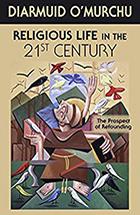Book Review: Religious Life in the 21st Century: The Prospect of Refounding
Posted on April 1, 2017, by Eileen Harrington CoL

Religious Life in the 21st Century is a small book, but tightly packed. Diarmuid O’Murchu takes the reader through the “drastic changes — the dying, grieving, chaos and dislocation” of refounding religious communities. He suggests that we humans are living now in a new paradigm: an evolutionary breakthrough, giving us a “radical new option to serve God in the heart of creation.” He exposes the patriarchal perspective under which women’s religious communities have developed their spiritualities, and the co-optation of their structure (originally lay groups) into the ecclesiastical model of hierarchy. He also tells the stories, not generally known, of several “Great Foundresses.” The present need, O’Murchu believes, is to shift their ecclesiastical allegiance so that they may serve the broader reign of God throughout the whole creation.
At the core of religious life, O’Murchu finds the “God quest” — as named by Sandra Schneiders, “a mystical allegiance to the divine mystery at the heart of all existence.” O’Murchu speaks of “the monastic archetype,” by which he means the deep yearning in the depths of the human heart for those values upon which human becoming can thrive and flourish; this is the grounding of religious community. Religious, then, are meant to be “cultural catalysts” of those values that carry deep meaning for all people, irrespective of time or culture. The role of religious communities is to live those deepest values and to “radiate” them, to bring them into life. The vows, re-named, are vows for mutual sustainability and mutual cooperation; interestingly, O’Murchu sees celibacy as a “call to androgyny” — a suggestion that will provide a lot of good conversation.
O’Murchu speaks often of “liminality,” by which he means being on the edge of culture. Communal discernment always, and on all these issues, will be of utmost necessity.
As noted, this is a small book, but tightly packed. It will provide an excellent catalyst for conversations as religious — especially religious women — engage in the difficult prospect of refoundation. The challenge is awesome.
